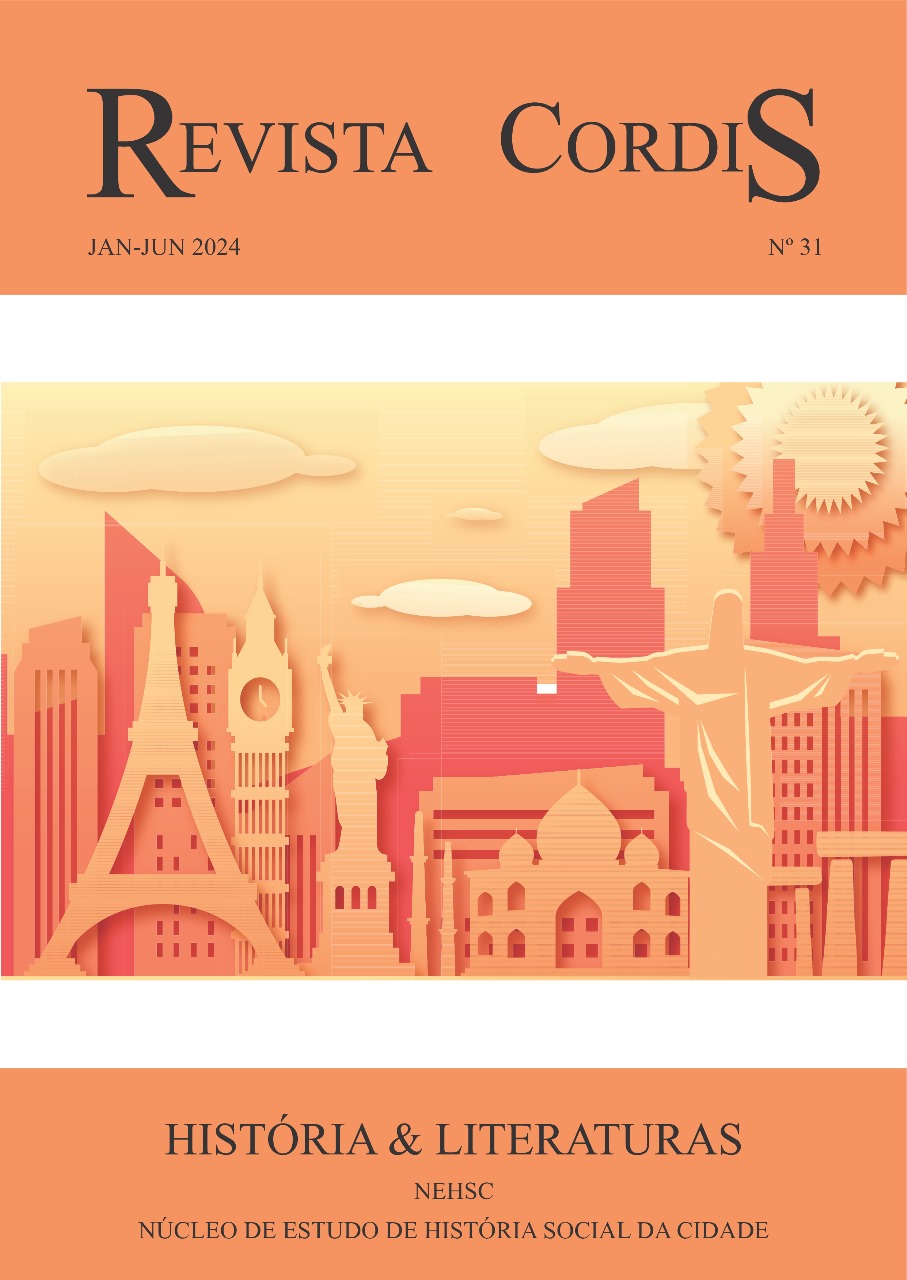Prometeu, coragem ou temeridade?
Uma análise histórico-literária sob a perspectiva aristotélica da ética das virtudes
DOI:
https://doi.org/10.23925/2176-4174.v1.2024e67057Palavras-chave:
Ética das virtude, Aristóteles, Hesíodo, Prometeu, Análise histórico-literáriaResumo
O presente artigo propõe-se a analisar o mito de Prometeu, criado por Hesíodo no século VII a.C. e presente em obras como Teogonia e Trabalhos e Dias, sob a visão aristotélica da ética das virtudes, a fim de responder à questão: Prometeu era um homem temerário ou de fato corajoso? Para tanto, o trabalho calca-se na leitura da principal obra de Aristóteles sobre a ética, a saber Ética a Nicômaco, e nas obras supracitadas de Hesíodo, nas quais é possível perceber a figura emblemática do ladrão de fogo. Embora os dois autores estejam situados em espaços temporários diferentes, busca-se fazer uma análise comparando essas nuances de olhar entre períodos históricos distantes, considerando o recorte temático da ética, especificamente; assim, o trabalho se propõe a fazer uma aproximação entre os dois escritos. O artigo estrutura-se com uma introdução, por meio da qual são relembrados conceitos importantes acerca da literatura e de sua relevância para a formação das sociedades; e com três seções subsequentes, a primeira tratando dos conceitos de vícios e virtudes para Aristóteles; a segunda versando sobre uma dessas virtudes, a coragem, e procura expor os dois vícios a ela atrelados: a covardia e a temeridade; e a terceira seção que finalmente se propõe a responder à questão primordial: Prometeu, temerário ou corajoso? Espera-se com este trabalho ser possível suscitar reflexões sobre a ética das virtudes e como elas se apresentam na literatura e na vida concreta.
Referências
ARISTÓTELES. Ética a Nicômaco. São Paulo: Martin Claret, 2015.
BERTI, E. As Razões de Aristóteles. Trad. Dion Davi Macedo. São Paulo: Loyola, 1998.
CÂNDIDO, A. Literatura e Sociedade. Rio de Janeiro: Ouro Sobre Azul, 2006.
CARPEAUX, O. M. História da Literatura Ocidental. Vol 1. Campinas: Sétimo Selo, 2021.
DETIENNE, M. Comparar o incomparável. Trad.: Ivo Storniolo. São Paulo: Editora Ideias e Letras, 2004.
ELIADE, M. Mito e Realidade. São Paulo: Perspectiva, 2019.
FERRAZ, R.B.; TAVARES, H.; ZILBERMAN, M. L. Felicidade: uma revisão. Rev. Psiq. Clín 34(5); 234-242, 2007. Disponível em: https://www.scielo.br/j/rpc/a/C9mmJsMKqzypbHLqv8vn4Gw/?format=pdf&lang=pt Acesso em 15 mar. 2024.
GONÇALVES, A. T. M. Entre gregos e romanos: história e literatura no Mundo Clássico. Revista Tempo, 2014. DOI: 10.5533/TEM-1980-542X-2014203612
HESÍODO. Os trabalhos e os dias. Introdução., trad., e notas: Alessandro Rolim de Moura. Curitiba, PR: Segesta, 2012.
HESÍODO. Teogonia: a origem dos deuses. Estudo e Trad.: JAA Torrano. São Paulo: Iluminuras, 1995.
HESÍODO. Teogonia. Trad.: Henry Bugalho. Curitiba: Kotter editorial, 2020.
HESÍODO. Trabalhos e dias. Trad., e notas: Sueli Maria de Regino. São Paulo: Martin Claret, 2010 (não recomendável).
PERINE, Marcelo. Nas origens da ética ocidental: a Ética a Nicômaco. Síntese: Revista de Filosofia, [S. l.], v. 9, n. 25, 1982. Disponível em: https://www.faje.edu.br/periodicos/index.php/Sintese/article/view/2163. Acesso em 15 mar. 2024.
PESSOA, F. Livro do Desassossego. São Paulo: Penkhal, 2021.
REALE, G. Introducción a Aristóteles. Barcelona: Herder, 1985.
ROBIN, L. L’activité pratique: morale et politique in Aristote. Paris, Presses Universitaires de France, 1944, pp. 209-225.
ROSS, D. Aristóteles. Lisboa: Dom Quixote, 1987.
SAMARANCH, F. Cuatro Ensayos sobre Aristóteles: política, ética y metafísica. Madrid: Fondo de Cultura Económica, 1991.
TORRES, M. M. C. História e literatura: reflexões teóricas. História, histórias, vol. 8, nº 15, jan./jun. 2020. DOI: http://dx.doi.org/10.26512/rhh.v8vi15i.25683 Acesso em 15 abr. 2024.
VENTURINI, R. L. B. As palavras e as ideias: o poder na antiguidade. Diálogos - Revista do Departamento de História e do Programa de Pós-Graduação em História, vol. 9, núm. 2, 2005, pp. 143-155, v. 9, n. 2, p. 143-155, 2005.
VERDI, M. C. P. B. B. A importância histórica do Direito Natural para a Justiça. [Dissertação]. PUC. São Paulo, 2005. Disponível em: https://sapientia.pucsp.br/bitstream/handle/8511/1/A%20IMPORTANCIA%20HISTORICA%20DO%20DIREITO%20NATURAL%20PARA%20JUSTICA.pdf Acesso em 10 abr. 2024.
VERGNIÈRES, Solange. Ética e Política em Aristóteles: physis, ethos, nomos. Trad. Constança Marcondes Cesar. São Paulo: Paulus, 1998.
Downloads
Publicado
Como Citar
Edição
Seção
Licença
Copyright (c) 2024 Dolores Puga Alves de Sousa, Mara Cléia Barbosa de Farias Silvério

Este trabalho está licenciado sob uma licença Creative Commons Attribution 4.0 International License.



